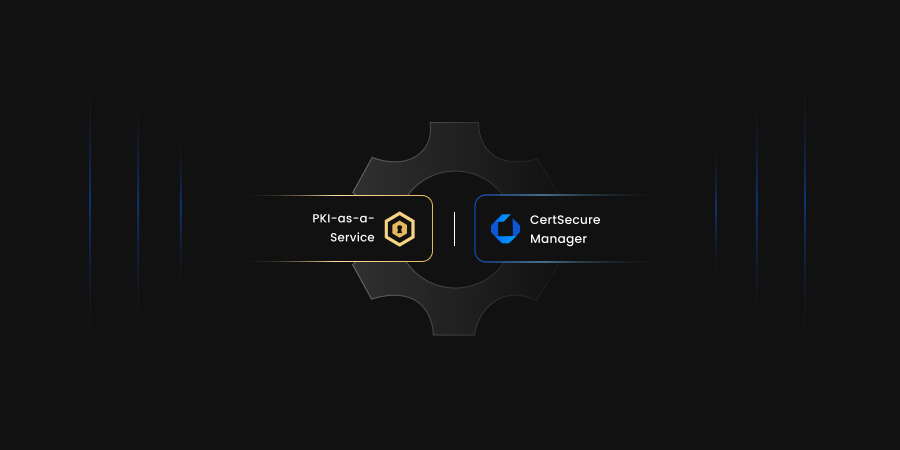Public Key Infrastructure (PKI) is a vital part of your organization’s security. Many PKI deployments are more than a decade old and still supporting various applications across the organization/business. However, the set of use cases, challenges, standards related to PKI has changed over the years. Today, organizations face different challenges while using PKI. PKI had emerged as a core technology to secure applications at the lead of digital transformations.
Today’s modern computing architecture, distributed workforce, and devices demand an advanced security level against constant and developing threats. This forces organizations to re-think their security perspectives to close potential vulnerabilities and meet expanding compliance requirements.
Modern Enterprise PKI Use Cases
-
Web and application servers
Enterprise should implement an advanced level of authentication and encryption across all websites and applications in their environment (on-prem and cloud) and behind the firewall. A trusted client-server authentication can be achieved by using SSL/TLS certificate to encrypt communication over the internet.
-
DevOps containers and code
The Engineering team in an organization can incorporate compliant certificate processes into their regular workflow with code signing certificates and high-volume, short-lifespan SSL certificates to ensure the integrity of containers, the code they run, and the production applications that use them.
-
Public-cloud certificate Management
A centralized certificate management solution can be used to manage all the certificates automatically in both your cloud and entire enterprise environment to ensure your applications are always running smoothly. The certificates protect your applications hosted in the cloud.
-
Zero-Trust Security
PKI Certificates and key pairs strengthen digital identity verification and secure connections between entities beyond the firewall network architecture to ensure a Zero-Trust Security Strategy.
-
Internet of Things (IoT) Devices
To securely build, scale, and manage the IoT ecosystem, it is vital to have a strong identity authentication and remote security deployment to all connected devices.
Devices are the most frequent Internet users, and they require digital IDs to operate safely. In addition, the rapid evolution of IoT technology is boosting demand for internet of things public key infrastructure (IoT PKI) as businesses seek to adapt their business models to stay competitive and secure.
PKI has long been a significant Internet security standard, with all of the characteristics required to provide the high degree of trust and security demanded by today’s IoT deployments. It offers robust and well-proven protection through encryption and authentication and digital signatures to validate data integrity. PKI is also a dynamic security approach designed to handle a variety of IoT use cases. Organizations can use PKI to ensure that users, systems, and devices securely authenticate and secure data in transit and at rest.
The public key infrastructure (PKI) is a set of hardware, software, policies, and procedures for creating, managing, distributing, and updating digital certificates over time. PKI is considered the backbone of Internet security for decades, and it’s now evolving as a flexible and scalable solution capable of fulfilling the data and device security needs of the Internet of Things. End-user adoption and productivity are boosted when friction is reduced, and PKI provides an intuitive experience that includes mutual authentication, encryption of sensitive data, and data integrity assurance. In addition, it allows for flexible deployment in a variety of environments and is scalable.
PKI eliminates the need for passwords and complex authorization checks. Devices need to share their public keys and can begin exchanging data. Digital certificates provide a secure environment for IoT devices to operate, minimizing data leakage and hacking risks with point-to-point encryption and flawless authentication. They also validate software upgrades, making it difficult for hackers to get access to the network. PKI is a key component of TLS (Transport Layer Security), and incorporating it into IoT could provide much-needed consistency.
-
Securing a Remote workforce
Post Covid-19 majority of the workforce is working remotely. The challenge for a remote user is also different and usual. A modern PKI platform will help the organization track the certificates centrally regardless of their location to overcome the unique challenges. It also offers automation to manage the certificates.
-
Approach towards cloud-security or multi-cloud environment
Organizations moving towards the cloud require strong authentication for their devices and users. For today’s increasingly diverse, multi-cloud environments, PKI solutions are ideal for securing digital trust. Standards-based, widely adopted, and flexible, they can provide strong security across a wide variety of environments, including enterprise systems, cloud storage, clients like email and document signing applications, virtualization, DevOps, and more.
PKI also enables organizations to strengthen authentication for dynamic cloud environments utilizing digital certificates and scale quickly to accommodate additional users, devices, and demands. Organizations can apply a unified approach to authentication, encryption, secure email, digital signing, and other PKI capabilities with the proper management platform. A modern approach to PKI will provide the flexibility for deployment in the cloud and on-premises, and in-country to meet specific requirements or application needs. A robust PKI management platform can also enable organizations to quickly deploy extremely high volumes of certificates, making the solution ideal for large, fast-growing enterprises. Organizations need PKI management platforms built with cloud-native and container-based technologies.
-
Code-signing
Code signing adds a layer of assurance for both internal and external-facing applications by informing the users that:
- The software they are using can be trusted,
- Any third party has not modified it since it was signed.
Modern PKI Best Practices
-
Proper planning
A detailed plan for PKI deployment is a must. Gartner says, “Security leaders that successfully reposition X.509 certificate management to a compelling business story, such as digital business and trust enablement, will increase program success by 60%, up from less than 10% today.”
-
Hire skilled resources
PKI is a critical infrastructure, so implementing and operating the PKI through the organization should be done with expert team members. They will need to outsource the PKI to a trusted expert. A managed PKI provider can help overcome this problem.
-
Audit the PKI
A regular audit of your PKI may help you overcome the security problems in your environment.
-
Store certificate and Key securely
Hackers can use various techniques to analyze and detect keys while they are in use or transit. Ensuring the keys are stored securely under FIPS 140-2 level 3 systems is a must.
-
Understand your use cases
Many organizations make this mistake; they design and deploy their PKI without brainstorming their use cases. It is essential to understand your organization’s use cases before finalizing the PKI design and deployment of PKI. When you know your use cases, you know what is best for your organization.
-
Root Key Ceremony
Implementing the Root Certificate Authority (CA) is almost like creating a “master key” to an organization’s network. The Root CA implementation is susceptible and should be handled and deployed in a controlled environment. The Root CA key Ceremony helps the organization record the event/activity formally, providing high assurance to the organization.
While deploying the Root CA, you must dedicate an HSM (Hardware Security Module) for your Root CA. This is a critical decision before deploying any of your PKI components.
-
Certificate Policies and Practices
In today’s digital world, a PKI is the best way for an organization to safeguard its sensitive data from unauthorized parties. Encryption serves as a lock and key to protect information from access by bad actors. Many organizations deploy their PKI as a project requirement and do not consider developing appropriate policies and procedures.
-
Certificate Policy (CP)
- A document that sets out the rights, duties, and obligations of each party in a Public Key Infrastructure.
- The Certificate Policy (CP) is a document that usually has a legal effect.
- A CP is usually publicly exposed by CAs, for example, on a Web Site (VeriSign, etc.)
-
Certificate Practice Statement (CPS)
- A document that sets out what happens in practice to support the policy statements made in the CP in a PKI.
- The Certificate Practice Statement (CPS) is a document that may have legal effect in limited circumstances.
Encryption Consulting’s Managed PKI
Encryption Consulting LLC (EC) will completely offload the Public Key Infrastructure environment, which means EC will build the PKI infrastructure to lead and manage the PKI environment (on-premises, PKI in the cloud, cloud-based hybrid PKI infrastructure) of your organization.
Encryption Consulting will deploy and support your PKI using a fully developed and tested set of procedures and audited processes. Admin rights to your Active Directory will not be required, and control over your PKI and its associated business processes will always remain with you. Furthermore, for security reasons, the CA keys will be held in FIPS140-2 Level 3 HSMs hosted either in your secure data center or in our Encryption Consulting datacenter in Dallas, Texas.
How Encryption Consulting Can Help
Encryption Consulting is a consulting company dedicated to protecting your organization from outside attackers. We offer many services, including certificate and key management, PKI assessment, design, implementation, PKI, and AWS training. Our encryption assessments help you identify any weaknesses in your network. At the same time, we design a roadmap to implement fixes for the security gaps, and we can help implement that roadmap. We can also help you implement and test your Disaster Recovery plan to ensure that no steps are missed and you are fully protected from malware like Ransomware. To learn more about our services and products, contact us at www.encryptionconsulting.com.




